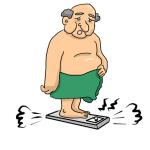Disclaimers first – the research involves mice, not humans, so we are on firm ground discussing the research results, but the ground gets shaky when we apply the findings to our lives.
weight loss
Obesity-related issues are more problematic than those associated with smoking, considering the tsunami of at least forty chronic preventable diseases, which result in its wake.
Years ago, I ran a full-exercise physiology or metabolic lab for a large medical practice.
Adele’s significant slim down has been credited to a combination of exercise and eating “sirtfoods”. So what is the sirt diet and could it work for you?
Two new studies, one surgical, the other medical come to similar conclusions - significant weight loss alters the course of Type 2 diabetes.
The question of which diet is best for which people has led to some strange prescriptions, such as the worthless Blood Type Diet (see here for our take on this one).
What’s the best way to eat if you want to lose weight? By this I don’t mean any particular diet or fad.
After 13 weeks of maternity leave — lots of joy and little sleep — I am back at work. In true New Years fashion, I — like many others — am thinking of making some resolutions for the year ahead.
For the extremely obese (i.e., those with a BMI over 40), the most effective means of losing weight and keeping it off is bariatric surgery — as we have di











